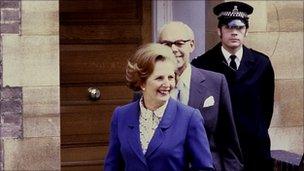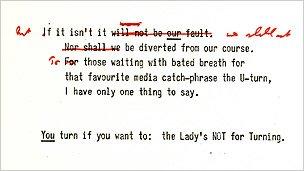Thatcher archives: 1980 fears over 'wasted year'
- Published

Smiles for the camera masked real concerns, private papers reveal
Margaret Thatcher feared she had "wasted" her first year as prime minister, newly released private papers suggest.
The letters and confidential briefing notes, from 1980, reveal the personal strains Lady Thatcher was under, as her economic policies failed to tame inflation - which peaked at 20% - and the country endured a year-long recession and soaring unemployment.
She faced growing hostility from the public and in one handwritten note talks of calling off a visit to Calne, in Wiltshire, which had just been hit by 450 job losses, after being barracked on a walkabout in nearby Salisbury, writing: "We can't go there. Not another occasion like that!"
She did visit Calne, however, and also ignored warnings from aides to avoid a trip to Hull, which had been hit by the collapse of its deep-sea fishing industry.
But there is evidence in the papers of a "cheer-up-the-PM campaign" by her aides in the second half of 1980 - with a stream of supportive letters from business people directed to her desk, urging her not to give in over her fight to tame the unions and boost enterprise.
There is also a private note from husband Dennis, drawing attention to "real life experience which shows... you're winning", as Conservative whips mounted a campaign to get her to to take a proper holiday.
Her reaction to finding a picture of a naked woman, in a News of the World press cutting, in a briefing note on the economy is not recorded.
The mood of Conservative MPs in confidential reports of backbench committees is grim and restive, with only the dire state of the Labour party at the time offering a crumb of comfort.
'Wets v dries'
Left-wingers wanted her to halt public spending cuts and pump money into the economy, while those on the right thought the cuts had not gone far enough or fast enough.

Lady Thatcher made last minute changes to what would become one of her most famous phrases
Policy chief Sir Keith Joseph did not help morale by repeating in public the view that Lady Thatcher's first year in Downing Street had been "wasted".
Sir Keith's exasperated press secretary reported his outburst to Lady Thatcher's media chief Bernard Ingham.
Mr Ingham replied, in a letter dated 1 December 1980, that Lady Thatcher was "quiet relaxed about it", adding: "I believe she agrees with Sir Keith but for the sake of the government and confidence in it does not say so."
The papers detail Lady Thatcher's struggles to hold her government together, with constant battles between left-wing "wets" and right-wing "dries" in her cabinet.
They also reveal for the first time the full extent of a campaign by her Principal Private Secretary Ian Gow to encourage backbench dissent against Jim Prior's employment bill.
The bill banned secondary picketing, but Mr Gow wanted it to go further and outlaw all forms of secondary industrial action.
The files show Mr Gow seems to have acted in collaboration with another minister, Solicitor General Sir Ian Percival, whose role had been noted by the Conservative chief whip.
Big Society
The papers, which are published online by the Thatcher archive, external and housed at Churchill College, Cambridge, where they can be accessed by the public, also include the full text of Lady Thatcher's 1980 party conference speech, in which she famously declared: "The lady's not for turning."
The phrase - an obscure reference to the title of 1948 play The Lady's Not for Burning - had been dreamed up by her speechwriter Ronnie Millar and was inserted into the speech at the last minute. Lady Thatcher's handwritten changes to the text can be seen on the typescript.
There are also extensive memos and private briefing notes among the 30,000 documents, detailing Lady Thatcher's battles with the trade unions and concerns over the state of the economy.
One letter, written by then Chancellor Geoffrey Howe, gloomily predicts the 1984 general election will see the Conservatives faced with the prospect of "doing something which has not been done before - winning an election despite not being able to offer the electorate much in the way of material improvement".
It is tempting to draw parallels with David Cameron's coalition government, as it battles to kickstart economic growth and curb the rise in unemployment.
There is even a passage in Lady Thatcher's 1980 conference speech which contains echoes of Mr Cameron's flagship Big Society policy.
She told delegates: "It isn't the state that creates a healthy society. For when the state grows too powerful people feel that they count for less and less... our aim is to let people feel that they count for more and more."
'Uniquely grim'
Chris Collins, of the Thatcher Archive, said Lady Thatcher and her advisers were keen to get away from using the dry language of "monetarism" and give their policies a more human and optimistic face.
But he warns against making too many parallels with the current government's situation, arguing that 1980 was a "uniquely grim" year for the British economy and that Mr Cameron's coalition is still in a honeymoon period by comparison.
"I think there are signs that she was feeling somewhat oppressed on occasion… it was hard going, no question," said Mr Collins.
But he added: "She doesn't flinch, she is not collapsing inwardly, she is not somebody who doubts herself or thinks the policy is completely wrong.
"It's certainly true that she thinks there are problems with it.
"The 'wasted year' doesn't make any sense as a concept if she thinks things are perfect - but it's oppressive influences from outside rather than inward cracking that I perceive."
'Argentinian relations'
The papers also reveal a meeting on 15 June 1980 between Lady Thatcher and an Argentinian government minister, Martinez do Hoz - two years before the Falklands War.
There is no mention of the Falkland Islands during the 15 minute meeting, which was recorded by junior minister Nicholas Ridley. It is entirely devoted to the Argentinian minister trumpeting the alleged success of his free market policies.
"What we are looking at is a warming up of Argentinian relations at this point," said Chris Collins.
"We are not looking to create tensions, we are looking to remove them and economic policy is probably the most profitable area to move on."
There are also details of an early skirmish over Europe, as Lady Thatcher considers withholding part of Britain's contribution to the budget of what was then called the EEC (European Economic Community).
At the time, Britain was on course to be the biggest net contributor to the EEC and Lady Thatcher had come to power with a mission to get Britain's money back.
But she was impatient with the efforts of Foreign Office ministers Lord Carrington and Iain Gilmore at marathon budget talks in Luxembourg.
A note from the Treasury on 29 May 1980, entitled EEC Budget: Withholding, was produced after Lady Thatcher had asked for an update on contingency planning to stop Britain's payments into the Community's accounts.
In the end, the then prime minister accepts the Luxembourg deal, but later goes on to obtain a rebate, which endures to this day.
Another document in the archive records a meeting between Lady Thatcher and a Eurosceptic group of Tory backbenchers, the Conservative European Reform Group.
According to a note by Ian Gow, the justification she gave for Britain's continued membership of the EEC was that if it "were to break up, Moscow would rejoice".
According to Chris Collins, she refused to let a note of the meeting be sent to the Foreign Office.
Lady Thatcher's official files, containing cabinet minutes and government documents as opposed to her own private files, were opened at the National Archives in Kew in January.
- Published21 March 2011
- Published30 December 2010
- Published30 December 2010